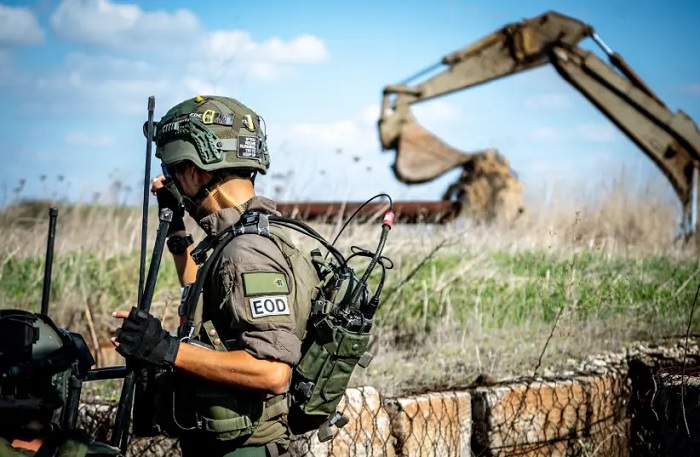
The military has been following cells of the Quds Force for several months that have been trying to plant explosives on the border.
The terrorist cell responsible for anti-personnel mines and other improvised explosive devices (IEDs) on the Golan Heights is being operated by Iran’s Quds Force, according to the IDF.
The Syrian cell, known as Unit 840, is a relatively secretive operational unit that plans terrorist infrastructure outside Iran against Western targets and opposition groups, the IDF said.
The anti-personnel mines discovered on Monday were planted several weeks ago by local Syrians under the command of the Quds Force, IDF Spokesman Brig.-Gen. Hidai Zilberman said.
Over the past few months, the IDF has been tracking Quds Force cells that have been trying to plant IEDs near the border, he said. Patrols by soldiers, drones and reconnaissance are being employed to prevent attacks, he added.
In response to the explosive devices, Israel carried out a wave of strikes that hit eight targets from the Golan Heights to Damascus, killing several military personnel.
The targets included an Iranian military complex near Damascus International Airport, a secret military barracks that acts as a housing complex for senior Iranian officials and visiting delegations, a command post for Division 7 of the Syrian army that cooperates with the Quds Force, and trucks that fired surface-to-air missiles toward IAF jets.
In August, soldiers from the elite Maglan reconnaissance unit, with air support, foiled an attempt to place explosives along the border fence with Syria. They killed the four-member terrorist cell.
Weapons and a bag containing a number of explosive devices were found about 25 meters from the border fence inside Israeli territory. The IAF fired at Syrian positions.
Israel has repeatedly warned against Iran’s aspirations of regional hegemony and has admitted to carrying out hundreds of airstrikes as part of its “war between wars” campaign to prevent the transfer of advanced weapons to Hezbollah in Lebanon and the entrenchment of its forces in Syria.
Although Israel usually refrains from targeting terrorist operatives, some strikes ascribed to it have killed several Hezbollah operatives in southern Syria on the Golan Heights, where the group has been trying to establish a permanent military presence.
 Eurasia Press & News
Eurasia Press & News

